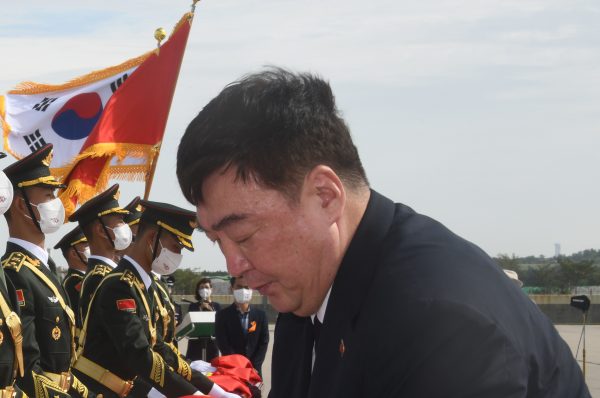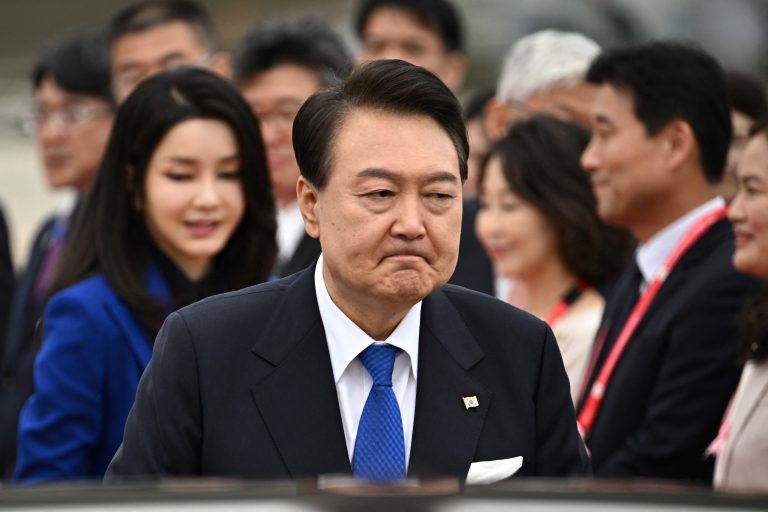Republic of Korea (ROK) President Yoon Suk-yeol and other political figures have issued biting criticism of Communist China’s ambassador to their country, Xing Haiming, who lectured South Korea on “decoupling” from Beijing and making “the wrong bet” in siding with the United States.
On Thursday, June 8, during a meeting with South Korean opposition leader Lee Jae-myung of the country’s Democratic Party, Xing advised the legislator that at present, the “United States is doing everything it can to suppress China, and some [countries] are betting on America’s victory and China’s defeat.”
“This is a wholly mistaken assessment,” Xing continued, “and betrays an incomplete grasp of the historical current. We can be certain that those who currently bet on China’s loss will definitely come to regret it.”
Xing’s comments come as South Korea strengthens geopolitical ties with the U.S. and Japan, and has adopted a more hardline stance on North Korea. Though the ROK has enjoyed close economic ties with China, the proportion of Chinese trade is falling, making up less than 20 percent of South Korea’s total trade volume at the beginning of 2023.

‘Displeasure of the Korean people’
During a closed-door cabinet meeting at the Blue House in Seoul on June 13 (Tuesday), President Yoon said that Xing’s remarks had incurred the “displeasure of the Korean people,” as reported by South Korean media.
Success
You are now signed up for our newsletter
Success
Check your email to complete sign up
Yoon added that Xing’s comments cast into doubt the Chinese Communist Party’s claims that its relations with the ROK are based on mutual respect and friendship.
Senior officials from the presidential office also told reporters that Yoon views Xing’s statements very seriously.
When asked if Xing would be declared a persona non grata, Park stated that the ministry had “clearly warned him, and he will be held responsible for all consequences.”
Shin Won-sik, a member of the conservative People Power Party (to which Yoon also belongs) stated that “an ultimatum should be issued to Ambassador Xing, demanding a sincere public apology in front of the Korean people. If he refuses, he should be immediately designated as a persona non grata and expelled.”
Prior to Yoon’s criticism of the Chinese diplomat, the ROK Foreign Ministry had on June 9 (Friday) summoned Xing for a stern warning and protest against his provocative statements, saying that they had violated diplomatic norms. The Ministry also expressed “strong regret” at Xing’s “intolerable remarks,” which it said amounted to interference in South Korea’s internal affairs.
Beijing has backed up its ambassador, with the People’s Republic of China (PRC) Foreign Ministry stating on June 12 that Xing’s exchanges with various parties in South Korea were “part of his duties.”
On June 9, PRC Foreign Ministry spokesman Wang Wenbin chided South Korea for the deterioration in bilateral relations, and on the next day, the Ministry summoned South Korea’s ambassador in China for a “protest.”
While direct criticism from the ROK head of state is a major gesture, this not the first time Xing has been harangued by his host country. This April, after the PRC Foreign Ministry lambasted Yoon for speaking out against a hypothetical communist invasion of Taiwan and told Seoul to “handle Taiwan affairs with caution,” the South Korean authorities sought an audience with Xing to protest the CCP’s “diplomatic impropriety.”
















